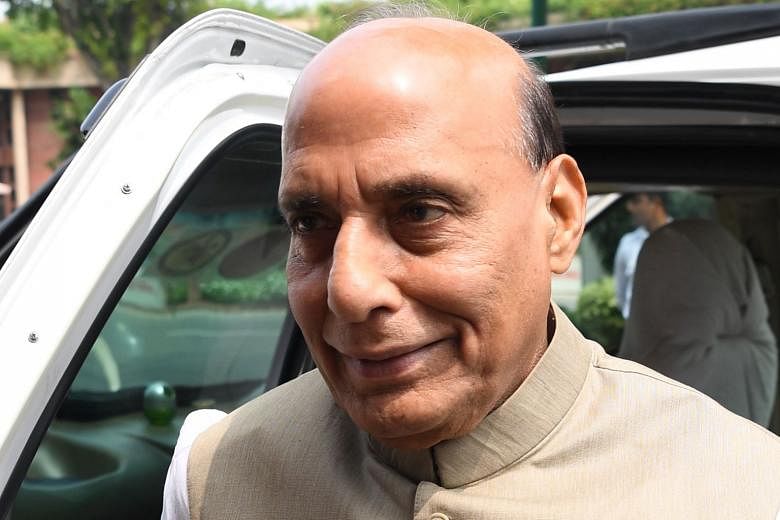Known to weigh his words, Indian Defence Minister Rajnath Singh has sparked a debate with a comment indicating that India's two-decade-old no-first-use (NFU) policy on nuclear weapons is not cast in stone. The ambiguous comment has been interpreted as a calibrated warning to Pakistan amid heightened tensions between the two countries following New Delhi's move to revoke Jammu and Kashmir's autonomous status earlier this month.
On Aug 16, Mr Singh visited the Indian nuclear test site of Pokhran, in Rajasthan's Thar desert, where he said: "Till today, our nuclear policy is 'no first use'. What happens in future depends on the circumstances." In a separate tweet, he noted that India has "strictly adhered to this doctrine".
This is not the first time that a re-appraisal of India's NFU policy has been hinted at. In 2016, the late Manohar Parrikar, who was then the country's defence minister, said that India should use its nuclear powers "responsibly" instead of stressing "no first use". This was later dismissed as his personal view by a Defence Ministry spokesman. No such denial has been issued so far in response to Mr Singh's remark.
These as well as other remarks by high-level functionaries contradicting India's NFU stand have led some experts to conclude that the policy has effectively been hollowed out.
"NFU isn't dead, but it's now meaningless. This has been a long time coming, but it's impossible to deny that a pillar of India's nuclear doctrine - NFU - is crumbling," tweeted Dr Vipin Narang, an associate professor of political science at the Massachusetts Institute of Technology and a member of its Security Studies Programme.
However, Air Vice-Marshal (Retired) Manmohan Bahadur of the Indian Air Force believes one should not be alarmed by Mr Singh's statement, saying that it essentially just indicates that a review of NFU will be carried out if required.
"The Americans have a periodic Nuclear Posture Review that reassesses the role of their nuclear weapons. The Chinese have started doing it now. So what's wrong with what the Defence Minister said?" he told The Straits Times.
A commitment to not be the first to use a nuclear weapon has been India's publicly stated policy since 1999. Its nuclear doctrine says "nuclear weapons will only be used in retaliation against a nuclear attack on Indian territory or on Indian forces anywhere".
However, the doctrine adds that India's "nuclear retaliation to a first strike will be massive and designed to inflict unacceptable damage".
Pakistan, on the other hand, does not have a similar position and has employed the threat of using its nuclear arsenal against India.
Air Vice-Marshal (Ret) Bahadur, who is also the additional director-general of the Centre for Air Power Studies, said NFU has worked best for India. "The problem is that people have started thinking nuclear weapons are war-fighting weapons. They are not. They are weapons for deterrence," he added.
"Pakistan must be in no doubt that India will retaliate massively to any nuclear strike by it. There should be absolute clarity about this in the adversary's mind and nothing should be said that dilutes this reality. That is the whole game of deterrence."
However, there are some who argue that India's NFU policy is outdated for a security environment that has evolved significantly since 1999. They point to how Pakistan has lowered the threshold for a potential nuclear strike against India with the possibility of using its "low-yield tactical nuclear weapons".
Lieutenant-General (Ret) Prakash Menon of the Indian Army, who is also the director of the Strategic Studies Programme at Takshashila Institution, said Mr Singh's remark could end up imposing more costs on India, outweighing any strategic gains.
"A first use of nuclear weapons can never be a credible threat fundamentally because if I were to use it first, I must ensure I knock off all the nuclear weapons of my adversary," he told ST.
Such an objective, Lt-Gen (Ret) Menon believes, will require India to make substantial changes to its existing nuclear structures, alert levels, deployment and command and control arrangements, as well as considerably augment its delivery systems and warheads.
But Dr Narang, responding in a subsequent tweet, claimed there are indications that India has already made many of these changes, "which is why Rajnath Singh's statement is so important".
Besides being a possible indication of these military advances, Mr Singh's remark is above all a political message aimed at Pakistan and China. Therefore, his remark - especially if it is perceived as a policy shift by these two countries - could increase the possibility for nuclear weapons to be deployed in military crises that may occur on India's borders with Pakistan and China.
This also risks drawing international attention to South Asia as a potential nuclear flashpoint, something Lt-Gen (Ret) Menon said India should not aim for.
"We should not be hyping it up. This is what Pakistan wants to do - hype up Kashmir as a nuclear flashpoint and get the world's attention. By doing so, India is following Pakistan's track," he said.

